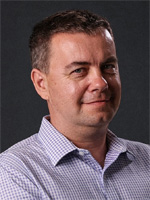Geo-partnering With Global Suppliers

By Louis Garguilo, Chief Editor, Outsourced Pharma

Andrew Trigwell deals in distances.
He kicked off an adventurous career as a technologist at AstraZeneca in the U.K, then wound through positions in The Land Down Under, at Aviragen Therapeutics (formerly BIOTA and currently Vaxart, Inc. ), Prana Biotechnology (now Alterity Therapeutics), and Catalent, before landing at Paradigm Biopharmaceuticals in January, 2020.
His name sounded vaguely familiar as he and I opened our video call, me logging in from Tokyo, he working an hour time-zone and 5,060 miles/8,144 kilometers further south in Melbourne, Australia.

So we have.
I’d sensed the familiarity of the name, but hadn’t noted the “formerly BIOTA” among his resume positions.
In 2011, biopharma start-up BIOTA received a Biomedical Advanced Research and Development Authority (BARDA) award of just over US $230 million, for funding the development of Laninamivir – a neuraminidase inhibitor (LANI) – targeting traumatic brain injuries inflicted during military combat.
The BARDA grant necessitated Melbourne-based BIOTA develop and manufacture in the U.S.
BIOTA selected Albany Molecular Research, Inc. (now Curia), some 10,385 miles/16,713 kilometers from headquarters.
My Australia-based business development manager at the time accompanied Biota to our facility in Rensselaer, NY. There I found myself sitting across a meeting table from Trigwell, then associate director of pharmaceutical development, and surrounded by our team, all plotting development and manufacturing strategy.
Now years later, we are again face-to-face, so to speak – this time my role is to learn Trigwell’s best practices for development and manufacturing drugs on a (very) global basis.
“Geo-partnering” Sounds Right
Paradigm Biopharmaceuticals Ltd. is focused on the commercial repurposing of pentosan polysulfate sodium (PPS) for the treatment of osteoarthritis (OA). The company has phase 3 trials addressing various aspects of the affliction, and states that “PPS has genuine disease-modifying potential.”
The organization was established in 2014 and listed on the Australian stock exchange the following year (ASX:PAR). It operates on a fully outsourced development and manufacturing model.
As Trigwell starts to outline for me the challenges of distance and time differences between Australia and where his development, manufacturing, and markets exist, the word “geo-partnering” comes to mind. (Consider it my lexical contribution to the outsourcing industry.)
What is geo-partnering? Listen to Trigwell.
“The first thing that stuck in my mind as I was thinking about our conversation was the need for real partnerships, because we are so geographically isolated.
“It’s critical we have reliable partners who don’t need their hands held. Our manufacturing base is in Germany [10,000 miles/16,093 kilometers away], an artifact of our drug-substance being originally developed there. It’s a good relationship, and our European-based vendors have global footprints.
“When we choose a company, we're looking at reputation, inspection history, capabilities, and their fit with our company.
“Customer service and communication are key to us. The time zone difference is a real obstacle. We have to work cooperatively within this geographic challenge.
“There is that gap where I ask something in my morning, and may have to wait 24 hours for a response. What plays in my mind as most important is when I ask something, I can know I don't have to follow up again the next morning. I’m confident something will be done, because of that solid relationship we have built.”
I ask him how the Germany connection began?
The answer originates with the original drug, which has been in the marketplace for veterinary use for decades, and is manufactured by a company outside of Munich, bene pharmaChem.
Paradigm’s founder formed a relationship with bene to access and further develop the compound for human use in new therapeutic areas, as well as a continuing R&D partnership to investigate novel targets. Under an exclusive long-term supply agreement across multiple jurisdictions, Paradigm purchased some material, then went looking for partners for the fill-and-finish of their investigational product.
Trigwell says Europe had plenty of manufacturers to select from. They settled on Siegfried, also in Germany. “That geographic coupling actually makes immanent sense,” he says.
The labeling, packaging and distribution for current clinical trials is partnered with PCI Clinical Services. Those trials, in keeping with our theme, are miles and miles, and countries apart.
As well as some of the factors mentioned above, another for selecting the best-fit, long-distance partners is “the proven ability of those providers to project-manage and adapt communication to the needs of a global customer.”
This can take different shapes.
Currently, says Trigwell, the Siegfried relationship is “quite hands off, because we have the drug product manufactured and selected the site, and have a validated process and batch. We're just ordering batches as needed at the moment.”
PCI, though, is “hands-on” at this crucial juncture.
“We have two large clinical trials dependent on them – one a global study for which I’ve got distribution responsibilities in the U.S., Canada, U.K., and Europe,” explains Trigwell. “I'm managing the supply chain of our bulk going from Siegfried to PCI to be labeled and packed, and then entered into the distribution arm of clinical studies around the world.”
Despite the distances involved, Trigwell has personally visited each development and manufacturing site in Germany, and met the professionals there working on his behalf.
Today, he conducts a quarterly call with Siegfried – and has started to discuss commercial supply strategy with them – and a weekly call with PCI.
When I ask him who is on the calls from his end, he laughs and says, “Just me and my dog.”
Internal Spread, Too
More than incidentally, Paradigm employees are also globally oriented.
About half of the 35-plus workforce is scattered across the U.S., including their chief medical officer in New York, director of safety in San Francisco, and head of the OA program in Chicago. (New York being the furthest, is 10,363 miles/ 16,677 km from Trigwell.)
At Outsourced Pharma, we often discuss geography as a strategic component due serious consideration when outsourcing, but Paradigm presents us a colorful tapestry depicting just how far and widespread possibilities can range.
Ending our conversation, though, Trigwell wants to make clear that Paradigm does consider CDMOs at home. “There certainly are options here,” he says, “but it was simply not a good strategic fit for the product at this stage.”
And besides, the proximity would surely disorient the geo-partnering Trigwell.
